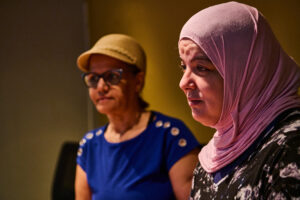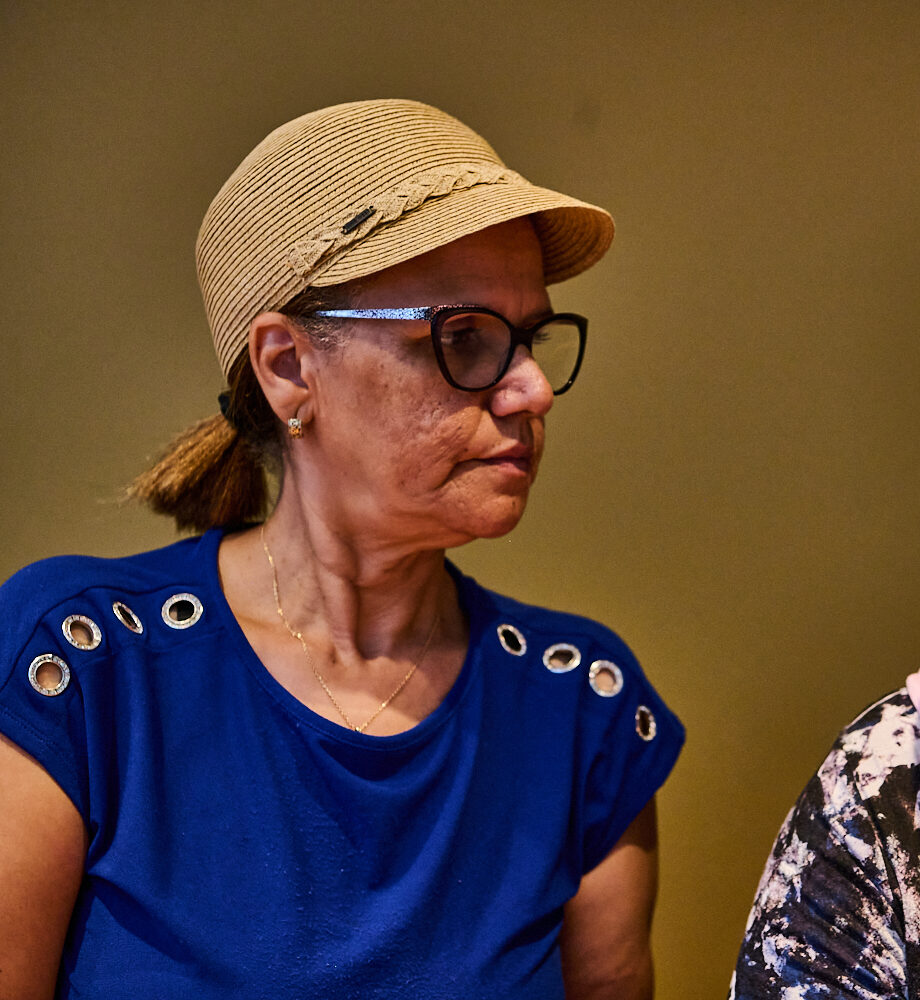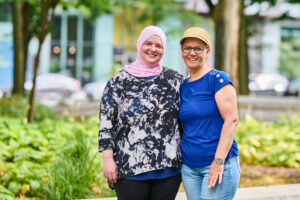In the heart of Montreal, the Chez Doris organization creates much more than mittens: it creates connections, stories of resilience, and rebirth. The weekly mitten-making program is much more than a craft workshop. It is a space for healing, solidarity, and dignity for women who have endured often unimaginable hardships.
Among them, two participants generously shared their stories with us, marked by exile, psychological abuse, loneliness, and the challenges of integration. Hadjira arrived in Canada in 2015 with her husband. What was supposed to be a smooth immigration process took a dramatic turn when her husband was arrested for serious crimes of pedophilia. In addition to going through a difficult divorce and intense pressure from her family not to leave her husband, Hadjira found herself alone, without any support or guidance. She becomes very emotional when recalling these events. Even though 10 years have passed, it is clear that the wound is still raw.
Hadjira quickly began training as a hairdresser to support herself. However, she soon fell ill, traumatized by this event. Unable to work, she had to abandon her plans. It was Chez Doris that reached out to her, offering her a bed, clothes, and above all, a listening ear and recognition.
 Ouassima, for her part, entered Canada in 2018 after a forced marriage in Morocco to a man dominated by a possessive mother. Leaving her country was not part of her plans. She was very attached to her family. After her marriage, she had to follow her spouse to Canada. The relationship deteriorated quickly. Ouassima was never accepted or recognized by her in-laws and suffered severe psychological abuse. Less than two years after their marriage, her husband abandoned her, deliberately choosing not to pick her up at the Montreal airport when she returned from Morocco.
Ouassima, for her part, entered Canada in 2018 after a forced marriage in Morocco to a man dominated by a possessive mother. Leaving her country was not part of her plans. She was very attached to her family. After her marriage, she had to follow her spouse to Canada. The relationship deteriorated quickly. Ouassima was never accepted or recognized by her in-laws and suffered severe psychological abuse. Less than two years after their marriage, her husband abandoned her, deliberately choosing not to pick her up at the Montreal airport when she returned from Morocco.
As he was the main breadwinner, she found herself isolated, without support or financial resources. She discovered Chez Doris thanks to a social worker who accompanied her in her efforts, explained the services available to her, and helped her regain her self-confidence.
She now lives alone in her apartment but continues to participate in Chez Doris activities. The community and support she finds there have become essential to her well-being.
Hadjira and Ouassima will meet thanks to the mitten-making program led by Christina Donolo, a volunteer who has been working with the women at Chez Doris for 15 years. The warm welcome, human warmth, and kindness that characterize these workshops quickly transform them into a real springboard for these women. Every Wednesday, they get together to sew, chat, laugh, and sometimes cry. They receive a $20 gift card for each session they attend, but more importantly, they receive warmth and kindness.
Some women, who had never sewn before, learn the techniques, help each other, and even become trainers for newcomers. The mittens they make are sold at events, and the funds raised are used to organize outings, meals, and offer even more services to those in need.
Beyond the material aspect, this program is a vehicle for regaining control. It allows marginalized women to find their place in society again, to feel useful, valued, and recognized. Hadjira is a fine example of this: thanks to the support she received at Chez Doris, particularly in reviewing and better understanding the questions, she was able to obtain her Canadian citizenship.
Hadjira and Ouassima embody remarkable resilience. Despite painful trials, they have regained confidence, dignity, and joie de vivre thanks to Chez Doris. There, they found a space to heal, create, and forge bonds. Today, they stand tall and radiant, reminding us that walking through a door can change a life.


